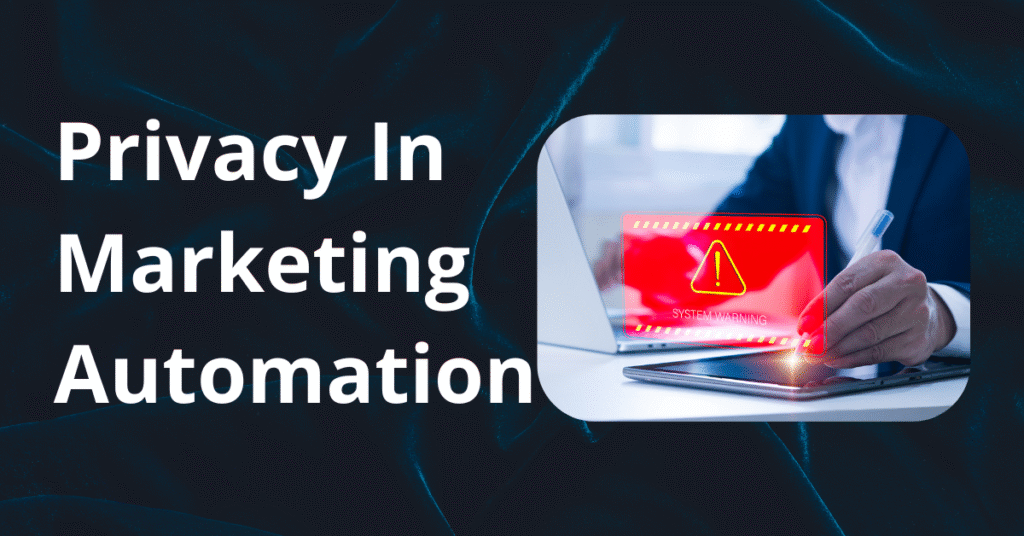
Key Takeaways
- Make privacy a core pillar of every automated workflow.
- Automate consent capture and updates across all touchpoints.
- Use governance rules to align with GDPR and CCPA.
- Personalize experiences with minimal, compliant data use.
- Partner with 4Thought Marketing to build privacy-ready automation.
Privacy in marketing automation is no longer just a compliance checkbox; it is a competitive advantage that shapes customer trust and engagement. As marketers automate more interactions, data handling and consent must evolve alongside. Many teams still treat privacy as a separate layer added after campaigns are designed. But integrating it from the start creates smoother workflows, better segmentation, and long-term credibility with audiences.
This blog explores how marketing teams can build privacy-first automation workflows—balancing personalization, compliance, and trust without compromising campaign performance.
Building a Foundation of Data Governance
Every privacy-first workflow begins with strong data governance. Marketing teams manage massive volumes of personal information collected through forms, events, and web tracking. Without structure, this data can quickly fragment across systems and violate privacy rules.
A data governance framework ensures that every piece of customer information has a defined purpose, retention period, and lawful basis for processing. By tagging data fields within automation platforms, marketers can control usage rights and access levels. Clear governance policies also make audits smoother and prepare teams for GDPR and CCPA alignment.
Embedding Consent Management at Every Step
Consent is the backbone of compliant marketing automation. Instead of managing permissions through disconnected spreadsheets or databases, modern systems can embed consent management logic directly within the customer journey.
When a contact fills out a form or joins a nurture program, their preferences—opt-in, purpose of use, and communication channel—should automatically update across segments and campaigns. This automation ensures that emails, remarketing ads, and lead scoring rules stay compliant in real time.
Consent management also improves customer trust. By giving individuals transparent control over their data, brands show respect for privacy while maintaining a clean and reliable marketing database.
Designing Compliant Personalization Strategies
Personalization remains central to marketing success, but it must respect individual privacy boundaries. Compliant personalization means tailoring messages using only the data customers have agreed to share.
Marketers can segment audiences by interest level or engagement history rather than demographic traits that might reveal sensitive details. For instance, instead of storing every behavioral data point, focus on what directly improves relevance and value. This data minimization principle not only satisfies regulators but also improves deliverability and message resonance.
Balancing personalization and privacy can seem challenging, but automation makes it manageable. Dynamic content blocks, preference centers, and adaptive journeys all help maintain engagement without over-collecting data.
Aligning Automation with Compliance Frameworks
Automating workflows requires more than marketing creativity; it requires marketing compliance discipline. Integrating privacy controls into systems ensures that campaign data flows meet both GDPR and CCPA standards.
Automation tools like Eloqua, Marketo, or HubSpot allow rule-based triggers that enforce consent checks before emails or ads are delivered. Marketers should document these processes as part of their compliance framework, making privacy protection demonstrable rather than assumed.
This proactive approach reduces legal risks and reinforces organizational accountability—showing regulators, executives, and customers that privacy is an operational priority.
Creating a Culture of Privacy-First Marketing
Technology alone cannot guarantee privacy; culture completes the equation. Marketing teams should treat privacy as a shared responsibility, not a one-time project. Training sessions, workflow reviews, and campaign audits should all reinforce privacy-first habits.
Encourage collaboration between marketing, IT, and compliance teams. When privacy experts understand automation tools and marketers grasp privacy frameworks, the organization achieves genuine alignment.
Ultimately, privacy-first automation is about humanizing technology—using it to build stronger, more ethical connections with audiences.
Conclusion
Embedding privacy into marketing automation is an investment in trust, accuracy, and long-term brand equity. As regulations evolve, organizations that prioritize privacy in marketing automation gain agility and credibility. By combining consent management, data governance, and compliant personalization, marketers can deliver experiences that respect customers while achieving measurable results.
If your team is ready to refine automation strategies or ensure global compliance alignment, connect with 4Thought Marketing. Our experts help transform marketing operations into privacy-first ecosystems that enhance both compliance and customer relationships.
Frequently Asked Questions (FAQs)
What does privacy-first marketing automation mean?
It refers to automation workflows that prioritize lawful data handling, consent management, and transparent communication while delivering personalized experiences.
How does consent management improve compliance?
By embedding consent capture and synchronization into automation systems, marketers ensure that all communications align with user permissions automatically.
What is the role of data governance in automation?
Data governance ensures consistent rules for collecting, storing, and using customer information across systems to meet privacy regulations.
Can personalization still be effective with stricter privacy controls?
Yes. Compliant personalization focuses on relevance and trust, using data customers willingly provide for meaningful engagement.
How can 4Thought Marketing assist with privacy compliance?
4Thought Marketing helps integrate privacy and automation tools, designing workflows that maintain compliance and optimize performance.





